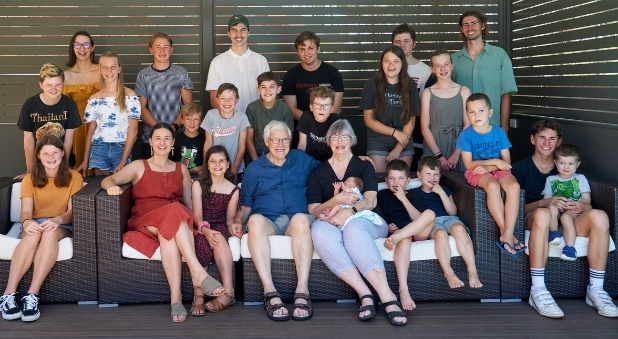What do you think being a mum is all about? I remember thinking during the birth of my firstborn, 50 years ago, isn’t this the 20th century? Surely there must be pain-free childbirth? Even having the epidural didn’t seem that pain-free, after a day’s labour.
Then there is the breastfeeding and then one adventure after another, not to mention the crying and the colic, the teething and the sleep patterns. As I read once, “Full-time motherhood is like holding down two jobs”.
You never seem to do enough for your child – the one-on-one time, the extra playtime that would be good, reading bedtime stories in peace and quiet. There always seems more to do and you often feel inadequate. You constantly compare yourself and your baby’s achievements to others the same age. You know: “My baby sleeps through the night”; “James is rolling over”; “Susie is sitting up”; “Phoebe has six teeth already”; “Sam was toilet trained in a week”.
Meanwhile, it’s taken you six months and they still don’t do poos in the toilet. And when you go out, yours seems to be the one that is badly behaved or maybe the one that is so shy they won’t leave your side. You just feel a failure.
And this is only the beginning! You never stop being a mother once you have begun and you feel every pain, every grief, every disappointment as though it was your own. There can be times in later years when your teenagers will do things you never imagined they would do. Mind you, all these things are balanced by very considerable joys as well, the joy of love.
My mother had only one child and I think that this was her ideal. I will never forget the look on her face when we announced that number four (bad enough in her view) was actually going to be twins. But I survived and have now reached grandmother status many times over.
Has it been worth it? I suppose I could have decided not to have children and/or accepted my mother’s unspoken but clear advice to have one child only.
I remember many years ago a friend of mine went door to door as part of a mission, equipped with a questionnaire. One question was, “What is the purpose of life?” When he asked this to a Greek lady in one house, she simply said, “To have children”. To my friend that seemed like a rather circular answer. We exist as a race simply to populate the planet with more of ourselves. We will die and simply replace ourselves. Is there not more to life?
Well, of course, there is. But the answer is not as strange as it may sound. As worldly people, we tend to think automatically in terms of this world alone. But according to God’s word, this life is only the beginning of what is. We are not born for this world, but for the world that is to come. In this world, however aged we may be, we are mere children compared to our adult selves, living eternally in the next world. In fact, we are immortals.
This life is only the beginning of what is.
When a baby is born, even a sick and disabled child, we are seeing the very first moments of the life of one who is destined for immortality. As parents, and I have to say, especially mothers, we are given the extraordinary privilege of bringing this little one into the world, of protecting it, feeding it, teaching it, loving it. From us – ordinary human beings – this child is going to learn love, learn truth, learn life itself. From us, this child is going to learn about God and through us, the little one is going to be invited into a relationship with God.
The amazing thing is that God has given this vital task to very ordinary people. We are not all leaders or professionals or professors or artists. Most of us work hard to make a living and to live unremarkable lives. Except that it is to people such as the mothers of the world the Lord gives a paramount task of growing children into adults who know and serve him and other people.
Is it too hard? Of course it is – if we are simply on our own. But the Lord tells us two vital things. First of all, he is in charge of all things. He does not leave us on our own. The first task of the parent is to pray for the child. And even when we feel like a failure – and which mother does not sometimes? – we need to remember that our God is the one who can do all things, redeem any situation, and bring good out of pain.
The second lesson he teaches us is forgiveness. We are forgiven through Jesus, and we need to forgive others because we have been forgiven. The home with Jesus at its centre is a home where forgiveness may be found. And the best thing a mother can do is to have the assurance of her own forgiveness and point to Jesus as the source of forgiveness and the inspiration of our own forgiveness for each other.
Who’d be a mother? I would not have missed it for the world!
Christine is married to Peter and they have five adult children and 26 grandchildren. She is the vice president (senior) of Mothers Union Australia.
























